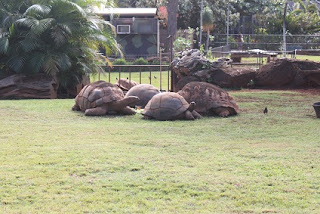Biological monitoring in Honolulu Zoo.
I visited Honolulu Zoo. I have visited many Japanese Zoo and Aquarium to see the effects of Fukushima Daiichi nuclear power plant accident.
It is my second time to visit Honolulu Zoo. I need to know animals of overseas. I think that radioactive materials from the site couldn't reach HI(Hawaiian Islands) because of its distance, so I guess I can see animals without contamination. So it is suitable for the control group when we compare Japanese zoo animals with others.
At the Zoo, I was surprised that the Zoo was very wider than that of Japan. All animals are respected and living in very wide spaces. They are fed vegetables or meats which are grown up here or main land. All animals look healthy and have no health concern.
Posted by Yoshitaka Kiriake from Japan on December 24, 2012.
福島第一原発事故による影響を見るため各地を訪問している。ホノルル動物園では約220種類の熱帯動物を観察することが出来る。彼らは我々と同じ環境で暮らしており、彼らの健康状態を見ることは重要である。
White snake
It is an albino.
ALOHA!
Entrance of Honolulu Zoo
About Honolulu Zoo
We can see 220 species of animals from the world.
Peacocks are waiking freely in the Zoo.
How big Komodo Doragon is!
I could take a picture very near the Tiger.
Beautiful wild birds live here too.
Rainbow and Diamond Head.
Moon and palm trees.
I could find no differences between Japanese zoo animals and that of Honolulu. Both animals are fine and not distinguishable.
However, people in Honolulu have no worry about the accidents because HI has no nuclear power plants and it is far away from Fukushima Daiichi nuclear power plant. They think radioactive materials from the site couldn’t reach here. So people in Honolulu are living without any worry about the accident.
Public Health
Network in Japan






























0 件のコメント:
コメントを投稿